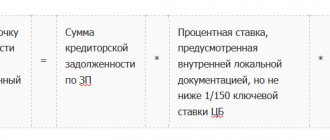Determination of payments
Employees do not know what incentive payments are.
The legislator defines them as incentives expressed in financial form. Conditions for receiving payments:
- whether the person has completed training;
- volume of labor produced;
- scope of qualifications;
- level of complexity of the work performed;
- quality of fulfillment of obligations;
- the severity of labor.
Such payments are considered as part of earnings. The law reflects an open list of payments due to employees. This suggests that the employer can introduce new types of payments. The method is chosen at the discretion of the company management. If we talk about regulating the issue by law, then we can highlight a couple of main acts.
The main one is the Labor Code. It contains the amount of allowances that employees are entitled to. Conditions for accrual are specified. These are other legislative acts. They reflect other types of surcharges. Their goal is encouragement.
Citizens can count on incentives from the company based on the provisions of labor law. The basis is the collective agreement in force in the organization. The act is signed at the time of registration of the employment relationship.
Payments for university teachers
Teachers' salaries are divided into two parts: basic and incentive. Following the current legislation, part of the funds intended for this group of public sector employees is no less than seventy percent for the teaching staff of universities, and no less than sixty percent for other educational institutions.
The remaining funds allocated by the state for wages are supposed to be incentive payments. An individual incentive payment is calculated in accordance with the regulatory documents of each individual educational institution.
The development of plans for bonuses for employees operating in education is carried out by the economic departments of educational institutions, together with representatives of the governing council of education, the trade union and members of the work team.
After the final calculation of the rules, conditions and amounts of incentive payments, the information is published on the institution’s website in the public domain.
The effectiveness of teaching activities, as well as the assessment of other teaching criteria, helps to calculate the number of expected incentives.
In most cases, incentive funds are divided among teachers based on accumulated points and evaluation sheets that help record teacher achievements.
The rating list for receiving payment is compiled according to the following algorithm:
- The total number of accumulated points for each teacher is determined;
- Payroll is divided by the total number of points scored, reflected in the cost of one point;
- The total number of points is multiplied by the cost of one of them.
The compiled rating list clearly identifies those teachers who will receive well-deserved bonuses.
Law
The main act that regulates the calculation of bonuses is the Labor Code. Such provisions are reflected in Articles 191, 129, 144 and 135. The Unified Recommendations, which were developed at the federal level, deserve attention. They are used at the municipal and regional levels. The act is approved at the federation level. A tripartite commission is responsible for this.
The commission includes employers, prof. unions and the Government of the country. Separate recommendations are developed for each industry. The Ministry of Health adopted the order in 2013. The document has number 421.
Types of payments
The legislator in the Labor Code of the Russian Federation reflects the types of payments. These include:
- premium;
- surcharge;
- allowances and so on.
The applicable factors are reflected in employment agreements. The appointment is carried out in accordance with the order for the payment of bonuses drawn up by the company management. Please note that not all employees are eligible for bonuses.
Payments are applicable only to those whose employment agreement stipulates the possibility of bonus payments. Their goal is to increase motivation to work. The laws prohibit the infringement of human rights through incentive payments. Bonuses cannot be deducted from employee salaries.
The bonuses that employees are entitled to are regular or sporadic. If bonuses are constant, then they are included in the salary. When calculating, the average level of earnings should be taken into account. Most often, the permanent assignment of incentives involves enterprises of state importance. In this situation, bonuses are included in the total payment. For accrual, it is necessary to have an agreement with trade unions.
One-time bonuses are paid under a separate act. Payments are made at the discretion of management. An employee has the right to receive such a bonus:
- for achievements in work;
- quality of performance of duties;
- improving the quality of the created product;
- participation in the life of the enterprise.
Incentive payments in a budgetary institution
This category of workers may qualify for the list of incentive additional payments prescribed in Order No. 818 of the Ministry of Health of the Russian Federation.
The amounts of individual allowances, as well as the conditions for their provision, are prescribed in the regulatory documents of the enterprise, or are introduced according to the order of the company manager.
Since two thousand and ten, the amount of funds provided to public sector employees in the form of incentive bonuses has amounted to thirty percent of those allocated from the federal and municipal budgets for salaries of public sector employees.
The table below shows options for additional payments for government employees.
| Group of incentive payments | Specific subgroups |
| Premium | Material reward based on work results for a certain period. |
| For work experience | Additional pay based on length of service; |
| Bonus based on existing official work experience. | |
| High-quality performance of duties | Additional cash incentives for advanced training; |
| Bonus payments for excellent performance of a task of national importance. | |
| Workload intensity | Additional payment for the complexity of the work; |
| Reward for high performance indicators; | |
| Bonuses for overcoming important tasks. |
Documenting
The company independently develops provisions reflecting incentive payments. The order developed by the Government in 2012 is used as the basic act for its preparation. The document was assigned No. 2190-r. Regardless of what type of document is drawn up, certain conditions must be taken into account:
- it is necessary to cancel previously assigned payments that have not been made for a long period of time;
- criteria regarding effectiveness are determined;
- the implementation of independent systems for assessing the quality of work performed is being implemented;
- premiums for indicators are introduced.
The provisions reflect information about the amount of accrued payments, frequency, reasons and positions of the people to whom they are due. Initially, when approving a new payment regulation, an analysis is carried out regarding the current form of incentives. It is necessary to abolish provisions that do not motivate workers to improve their work standards.
What are incentive bonuses and surcharges?
Incentive payments are a cash bonus to the basic salary, designed to motivate employees to increase labor productivity and comply with internal labor regulations.
The employer decides which payments qualify as incentive payments. It can be:
- various awards;
- bonuses for exceeding the plan;
- increased tariffs for length of service and lack of penalties;
- rewarding the best employees based on the results of the reporting period, etc.
The name can be anything; the Labor Code does not regulate this in any way. The only caveat is that incentive payments cannot include funds that the employer must pay by law (night, holiday, overtime, etc.).
Order for a bonus
Article 57 of the Labor Code says that the conditions regarding payment act as mandatory sections that are prescribed in contracts. When the agreement specifies that bonuses are accrued every month, they are included in the total salary - the employer bears the responsibility for accrual. Whether a person performs his or her job duties within the established norm or not does not affect the purpose of payments.
If the order for awarding bonuses is based on the Regulations, then a number of nuances will have to be taken into account. The amount is influenced by how management evaluates the employee’s work and so on. This suggests that the calculation is made on the basis of the norms established by local acts. It has been established that when establishing the mandatory nature of the incentive payment, it is not necessary to issue separate orders regarding its payment every month.
Prizes are awarded for excellent results in production. Then it is necessary to issue an order every time a person is awarded a bonus. The document is based on memos and other petitions.
Who gets it?
All working citizens of both budgetary organizations and commercial ones have the right to receive incentive payments. Funds for accruals are taken from the enterprise's wage distribution fund.
How are executive compensation determined?
Like ordinary employees, the management of the enterprise has the opportunity to receive incentive payments to their salary. Their work and the reason for accrual of such additional payments are assessed according to appropriate criteria by the regulatory authorities of these enterprises. These criteria are reflected in the employment contract. Usually this:
- quality of work with employees, staffing levels;
- level of enterprise performance indicators and others.
Peculiarities of appointment to social workers
For teachers
To distribute the fund of incentive payments to employees of educational institutions, a point system is used.
There is a maximum number of points, based on which, taking into account the total volume of the fund, the value of one point is determined. Each employee has a score sheet with performance results and the amount of remuneration due. The procedure for calculating this system:
- The number of points earned is calculated for each teacher.
- The number of points of all employees is summed up.
- The value of one point is determined by dividing the fund's monetary value by the total number of points in a given institution.
- The additional payment is calculated individually - the points earned by the teacher are multiplied by the cost of one.
In the work of teachers, not only the performance of students is assessed. Extracurricular activities play a big role.
It is important whether the teacher takes part in special projects - excursions, hikes, socially significant events.
Participation in student achievement research is also considered and highly valued.
Dynamics of academic performance, participation in working with parents, in competitions, participation in the development of educational programs, working with children from disadvantaged families, design of the classroom - all these are criteria for assessing the work of a teacher.
The more he participates in these activities, the higher his points and incentive payment.
In preschool educational institutions, the incentive payment fund is divided between:
- educators and teachers. They receive 60% of the fund;
- other employees (nannies, cleaners, cooks, watchmen, auxiliary workers).
The criteria for evaluating their work is the success of clubs, electives, and educational programs.
The criteria for evaluating school directors and kindergarten managers are:
- active parenting;
- no complaints from parents;
- specialized training;
- attracting young specialists to work;
- performance indicators and USE results;
- availability of programs to work with children with special talents and gifted children.
The conditions of appointment and the amount of incentive payments are regulated by the Regulations, which are valid in each individual educational institution.
The adoption of such a provision is made only after discussing all the conditions with the labor collective at a meeting of the teachers' council.
The manager issues an order of appointment, the order is valid for a certain amount of time.
The Regulations also stipulate the conditions under which the amount of payments may be reduced or even withdrawn completely:
- violation of labor discipline, internal regulations or job descriptions;
- poor quality of performance of duties;
- violation of sanitary and safety regulations;
- presence of complaints;
- damage to property.
For health workers
For health workers, the procedure for incentive payments is regulated within the framework of a special program for the modernization of healthcare, which began in 2011.
Now not only doctors, but also middle and junior medical staff can count on them.
Since the program is being implemented throughout the Russian Federation, the process in each region is led by regional health authorities. They set criteria for evaluating the work of specialists and appointing them to positions.
The amount of payments is determined by the institution where the employee works. The criteria are usually established taking into account the population size, its density, gender composition, age composition, morbidity characteristics, and mortality of a particular territory.
The amount of incentive payments, taking into account all these criteria, depends on the number of services provided and varies depending on the location, the scale of the medical institution and its profile. Each institution also sets the following criteria:
- assessment of the work of a health worker. Compliance with standards and work deadlines;
- compliance with standards of medical care;
- time actually worked (full-time, part-time, part-time).
Cases when incentive payments are not awarded:
- managers who are not practicing doctors in the same medical institution;
- doctors receiving payments for participation in the national project “Health”;
- employees of medical institutions who receive additional payments for working with high-tech equipment.
Based on the order of the head physician, a health worker may be deprived of the assigned payment for failure to comply with the standards prescribed in the local act of work quality requirements.
For cultural workers
Cultural workers can also receive regular and one-time incentive payments. Regular ones are established by law, one-time ones are assigned in the form of incentives based on performance results.
These are payments for:
- quality of work;
- class, professional excellence;
- continuous work experience in cultural institutions
- presence of a degree, title “national”, “honored”;
- performing particularly important work.
Payments are established in accordance with the Regulations on Incentive Payments and distributed from the relevant institution fund.
How the 13th salary is calculated is a question that often interests employees of government agencies. When an organization is liquidated, employees are entitled to compensation. Which ones exactly – read about it in detail here.
Salaries for employees who work on a shift schedule are calculated according to a special scheme. Read more about this in our article.
Reasons
Organizations need to take into account nuances when developing Regulations. An important factor is the financial position of the company. You need to pay attention to the fact that there must be several reasons for payments. These include:
- implementation of complex tasks;
- excess production according to standard hours;
- company anniversary;
- exceeding the established plan;
- performing job duties for a certain period;
- prof. celebrations.
Registration process
Initially, a memo is drawn up. It reflects the merits of a particular employee. The head of the department reflects a request for a bonus for an employee. For example, because he exceeded the plan or worked in difficult conditions.
In relation to ordinary employees, the specified note or petition is drawn up. In a situation where a person holding a leadership position in a company is subject to a bonus, it is necessary to make an introduction. These acts are drawn up by the management of the department and sent to the management of the enterprise.
If the company has a large number of employees, bonus issues are the responsibility of department management. They write resolutions on filed motions or briefs. After approval takes place, the note is transferred to the employee who is responsible for the preparation of administrative documents.
Often, orders regulating financial activities are formed by the company's accounting department. Registration is carried out in a journal that includes information about personnel. This act is developed in a single copy for all employees.
Form for issuing a bonus order
An internal document submitted by the head of a division addressed to the director of the enterprise (memorandum) can serve as a petition for a bonus to an employee.
The most common reasons for applying to management for bonuses for individual employees or departments as a whole are:
- conscientious performance of official duties or individual instructions of management;
- exceeding the planned target based on the results of the year, quarter or month;
- recycling.
The head of the enterprise must put his resolution on the petition submitted to him. The employee’s personal data for inclusion in the order is contained in the work book and personal file (registration card) of the employee. The State Statistics Committee of the Russian Federation, by its order dated January 5, 2004 No. 1, approved the forms of orders for bonuses:
- No. T-11 – in relation to an individual employee;
- No. T-11a - in relation to employees belonging to the structural unit of the enterprise.
Since 2013, the use of the above forms is not mandatory and is advisory in nature for enterprises.
Standard rules for drawing up documentation of this kind require the following information:
- name of the enterprise (organization, institution);
- code;
- title;
- place and date of compilation;
- descriptive part (grounds for bonuses and employee details);
- final provisions;
- signatures of the manager and interested parties.
The details of the enterprise must fully comply with those specified in the constituent documents. In the descriptive part, in addition to the last name, first name and patronymic of the employee being awarded, his personnel number, position held or work specialty, type and amount of the incentive bonus should be indicated.
The head of an enterprise or institution, the director of a school, or the rector of a university has the right to sign the corresponding order. In some cases, provided for by internal regulations, this right may be granted to deputy managers or heads of departments. In addition, it is necessary to comply with the legislation on familiarizing employees with the provisions of the order. This document belongs to the category of personnel documentation. The storage period for such documentation is set at 75 years.
Content part
Most often, an order reflecting the accrual of bonuses is drawn up in form T-11. It can be downloaded on the Internet. You can use different sites. Filling out this form is quite simple. It reflects basic data about the enterprise and the person who is entitled to the bonus. You need to register the amount that is due to the person. In some situations, companies develop the form themselves. Then it necessarily reflects:
- company name;
- information about the date and place of drawing up the act;
- the name of the position of the person who is entitled to the bonus, including his last name and initials;
- basis for developing a bonus document;
- At the end, the signatures of the manager and the person being awarded are placed.
The basis is a memo. The details of the parties must also be reflected. Due to the fact that the document in question is to be used within the company, several details will be reflected in it. This includes the company’s seal, its full name and OKPO codes.
Not all companies provide bonuses to their employees every month. It is reflected that bonuses can be paid with greater frequency. Can be equated to the reporting period. This is a half year or quarter. Companies independently determine the frequency of payments. It depends on what is stated in the Regulations regarding the payment of bonuses.
Which form should I use?
The legislator does not establish requirements regarding the use of only the T-11 form. Companies are developing forms that are subsequently used to issue bonus orders. Disputes may arise as to which act is best to use in practice.
The sample order for incentive payments depends on the specifics of the organization’s activities. The provisions of the laws must be taken into account. The document is signed by the company management. The order is drawn up by the staff of the personnel department. The law reflects possible types of incentive payments.
A certain content of the document is provided. Organizations independently decide how often to pay bonuses. There is no unified model; only the T-11 form is reflected in the law. You can use it or develop your own form. It is mandatory for workers to familiarize themselves with the orders. Familiarization is carried out against signature. Otherwise, the person can appeal the decision.
Who signs
Often, persons performing management functions at the enterprise have the authority to sign the documents in question. It is worth pointing out that local acts of the company may stipulate otherwise. Other officials will be able to sign the bonus order if this is reflected in the documents. In particular, these are deputies or heads of structural divisions of the company. Provided that the manager is not on site.
Situations rarely arise that employees do not know about accrued bonuses. A person needs to familiarize himself with the act reflecting the payment of bonuses. Therefore, everyone about whom information is included in the bonus order must put their signature on it. This implies acceptance of the payments.
Is it necessary to familiarize employees with the bonus regulations?
By law, the organization is obliged to familiarize the employee with local regulations if it affects his work activities.
Typically, this must be done when hiring a new employee to the organization, even before signing an employment contract with him. If changes are made to the document, then all company employees also need to be familiarized with the new version.
You can record the fact of familiarization in one of the following ways:
- By placing a signature on the regulatory act itself;
- Maintaining an introductory sheet for each act or one general one;
- Maintaining an introductory journal, the pages of which must be numbered and stitched.
Attention! There are no strict deadlines during which it is necessary to familiarize employees with the amended local act. In the case of the Regulations on bonuses, it is advisable to do this before the bonuses are accrued for the month worked.
Sample order for incentive payments
It is not difficult to develop an order for the payment of bonuses. It is worth considering the basis on which the document is drawn up. This could be overtime, good labor performance, holidays, etc. The document reflects the name of the company and the details of the employee who is entitled to the bonus. The basis for calculating bonuses and their amount must be specified. The date of drawing up the act and the signature of the management are also indicated.
A sample order is presented below:
Calculation example
Let's take the salary of endocrinologist Ivanov I.I. in the amount of 30,000 rubles. The regulatory documents of the institution provide for incentive additional payments for length of service and category of doctor.
The specialist has been working in this clinic for ten years, receiving a twenty percent bonus for experience. And having the highest category, he receives another thirty percent additional payment.
The total salary of a doctor will be:
30,000 * 20% + 30,000 * 30% = 30,000 + 6,000 + 9,000 = 45,000 rubles.
Information about dismissed people: is it included?
After the termination of the employment relationship, the person is no longer part of the enterprise team. This means that the provisions reflected in the local documentation do not apply to it. In addition, administrative acts are not applicable to those who are dismissed from the company. Article 140 of the Labor Code states that a resigning person must pay all funds due on the last working day.
This amount includes bonuses. If by the time bonuses are paid the employee has already been dismissed from the company, then there is no need to include him in the list.










